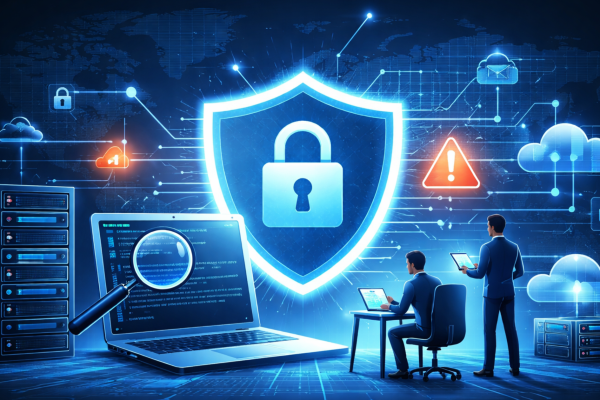Cyber Security Services to Protect Against Modern Threats
In today’s digital age, cyber threats are increasing more rapidly than ever before. Every day, businesses, governments, and individuals face attacks that can steal data, cause financial loss, or damage reputations. That’s why Cyber Security Services have become a must for protecting against these modern threats. These services help detect, prevent, and respond to cyber risks, keeping your systems and data safe.
In this blog, we will explain what Cyber Security Services are, why they are important, and how they protect against modern cyber threats. We’ll also explore the various types of cyber security solutions that are available today.
What are Cyber Security Services?
Cyber Security Services are expert solutions designed to safeguard your computers, networks, software, and data from cyber threats. These services include tools, processes, and experts who monitor systems, detect threats, and respond quickly to cyberattacks.
Cyber Security Services can be offered by specialized companies or managed in-house by large organizations. They cover areas such as network security, endpoint protection, data encryption, and more.
Why Are Cyber Security Services Important?
Cyber attacks are becoming more advanced. Hackers use modern techniques like phishing, ransomware, and zero-day attacks to break into systems. A single data breach can result in financial losses of millions of dollars for companies. Malware consists of viruses, worms, and trojans that can harm your system or steal your data. It can also result in lost customer trust and legal penalties.
Here’s why Cyber Security Services are important:
- Protect Sensitive Data: They help secure personal and business data.
- Prevent Financial Loss: They reduce the risk of attacks that may lead to costly losses.
- Ensure Business Continuity: Cyber security helps keep your business running during and after an attack.
- Meet Compliance Standards: Many industries must follow security regulations. Cyber Security Services help you stay compliant.
Common Cyber Threats in the Modern World
To understand how Cyber Security Services help, it’s important to know about the most common cyber threats today:
1. Phishing Attacks
Phishing is when attackers send fake emails or messages to trick users into giving personal information like passwords or bank details.
2. Ransomware
Ransomware is a type of malware that locks your data until you pay a ransom. It is one of the most damaging cyber threats.
3. Malware
Malware consists of viruses, worms, and trojans that can harm your system or steal your data.
4. DDoS Attacks
Distributed Denial of Service (DDoS) attacks flood a website with traffic to make it crash and go offline.
5. Insider Threats
Not all threats come from outside. Sometimes employees or former employees misuse their access to harm the company.
6. Zero-Day Exploits
These are attacks on software bugs that haven’t been fixed yet by the developers.
Cyber Security Services are designed to handle all these threats with a range of tools and strategies.
Types of Cyber Security Services
There are different types of Cyber Security Services available. Each type focuses on protecting a specific area of your IT environment.
1. Network Security
This service protects the internal network from attacks by securing firewalls, routers, and traffic flows.
Key Features:
- Firewalls and intrusion prevention systems
- Network monitoring
- Virtual private networks (VPNs)
2. Endpoint Security
Endpoint security defends devices such as computers, smartphones, and tablets that connect to your network.
Key Features:
- Antivirus software
- Device management
- Threat detection and response
3. Cloud Security
As more businesses move to cloud platforms, securing cloud-based systems is critical.
Key Features:
- Secure cloud access
- Data loss prevention
- Identity and access management (IAM)
4. Email Security
Email is one of the most common paths for cyber threats like phishing and malware.
Key Features:
- Spam filters
- Phishing protection
- Attachment scanning
5. Data Security
Data security services focus on protecting your sensitive information from theft or loss.
Key Features:
- Data encryption
- Backup solutions
- Secure storage
6. Identity and Access Management (IAM)
IAM ensures only authorized users can access your systems.
Key Features:
- Multi-factor authentication (MFA)
- Single sign-on (SSO)
- Access control policies
7. Security Information and Event Management (SIEM)
SIEM services gather and examine security data from your entire system to identify and respond to threats.
Key Features:
- Real-time alerts
- Threat intelligence
- Log analysis
8. Penetration Testing and Vulnerability Assessment
These services simulate attacks to test your systems and find weak points before real hackers do.
Key Features:
- Security assessments
- Risk reporting
- Fix recommendations
Benefits of Using Cyber Security Services
Businesses and individuals can benefit in many ways from using professional Cyber Security Services:
1. 24/7 Monitoring
Cyber threats don’t follow office hours. Managed services provide you with continuous, 24/7 monitoring and protection.
2. Expert Knowledge
Cyber Security Service providers hire experienced professionals who stay updated with the latest threats and technologies.
3. Cost-Effective
Hiring a full-time in-house team can be expensive. Cyber Security Services provide affordable protection with flexible plans.
4. Fast Threat Response
With proper tools and experts, you get faster response to attacks, reducing damage.
5. Compliance Support
Cyber Security Services help businesses meet legal and industry-specific regulations like GDPR, HIPAA, and PCI DSS.
How Cyber Security Services Protect Against Modern Threats
Let’s look at how Cyber Security Services defend against modern cyber threats:
Real-Time Threat Detection
Services use tools like SIEM and AI to detect threats as they happen, allowing quick response.
Advanced Firewalls and Antivirus
Firewalls block unwanted traffic, while antivirus software removes harmful files.
Threat Intelligence
Cyber Security providers use global threat databases to understand new attack methods and prepare defense strategies.
Security Awareness Training
Some services offer training to employees so they can recognize phishing emails and avoid risky behavior.
Incident Response
If a breach occurs, experts act fast to control the damage, investigate the cause, and recover lost data.
Who Needs Cyber Security Services?
Almost everyone who uses the internet needs some level of Cyber Security Services, but some groups need it more:
Small Businesses
They often don’t have in-house IT teams, making them easy targets for hackers.
Large Enterprises
Big companies handle large amounts of data and are often targeted for ransom or espionage.
Healthcare Providers
They manage sensitive patient data and must follow strict compliance laws.
Financial Institutions
Banks and fintech companies must protect customer money and data.
Government Agencies
Governments are prime targets for cyber terrorists and foreign hackers.
Educational Institutions
Schools and universities hold sensitive information on thousands of students and staff members.
How to Choose the Right Cyber Security Services
Selecting the right provider is crucial to ensure the highest level of protection. Here are some tips:
- Check for Experience: Choose a provider with a proven history of success in your industry.
- Look for Certifications: Trusted providers often have ISO 27001, CISSP, or other certifications.
- 24/7 Support: Ensure they offer support around the clock.
- Scalable Solutions: Pick a service that can grow with your business.
- Custom Security Plan: Your needs are unique. The provider should offer a custom security strategy.
Future of Cyber Security Services
As technology advances, so do cyber threats. The future of Cyber Security Services will involve more:
- AI and Machine Learning: For smarter threat detection.
- Zero Trust Architecture: Always verifies user identity and access permissions before allowing entry.
- Automation: For faster incident response.
- Security for IoT: Protecting devices like smart TVs, cameras, and other connected tools.
Businesses will continue to rely on Cyber Security Services to stay ahead of attackers and secure their digital environments.
Conclusion
Modern threats are complex and always changing. Whether you’re a small business or a large enterprise, investing in Cyber Security Services is not optional—it’s necessary. These services give you the protection, expertise, and tools needed to fight against today’s cybercriminals. From preventing data breaches to ensuring compliance, Cyber Security Services help you stay safe and secure in the digital world.
Author







